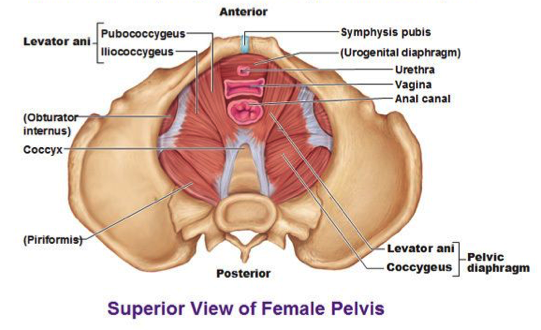What is the Pelvic Floor?
The pelvic floor is made up of layers of muscle and other tissues including fascia and connective tissue. These layers attach at the pubic bone and extend back to the tail bone; forming a hammock like structure. In females the pelvic floor supports the bladder, uterus and bowel and the urethra, vagina (birth canal) and the rectum pass through the pelvic floor muscle group. Hence, these muscles play a part in bladder and bowel control as well as sexual function and sensation. When there is an issue with pelvic floor control this is known as pelvic floor dysfunction.
What can weaken the Pelvic Floor Muscles?
Some things that can weaken the pelvic floor include:
- Pregnancy and birth
- Lack of fitness
- Poor ‘core’ strength
- Persistent or constant heavy lifting
- Continuous straining to empty bowels
- Surgery
- Being overweight
- Changes at hormonal level e.g. menopause
- Chronic cough e.g. Smokers cough, chronic bronchitis or asthma
Pelvic Floor Conditions
- Antenatal Care and Assessment
- Post Natal Care and Assessment
- Vaginal Prolapse
- Pelvic Pain
- Incontinence (stress/urgency)
- Urgency (overactive bladder)
- Faecal incontinence
- Bowel Conditions e.g. Constipation
- Sexual Pain
The Importance of Maintaining Pelvic Floor Strength
Maintaining pelvic floor strength is particularly important for women whom are hoping to fall pregnant or is currently pregnant as it allows the body to cope with the weight of a developing baby within the pelvis. Having good pelvic floor strength and control, including the ability to relax through these muscles, will help throughout the birth and allow for easier recovery post birth.
Those who suffer from stress incontinence, leaking with sneezing, coughing, jumping or exercising, will benefit from increased pelvic floor strength to help control this issue. Like wise, pelvic floor muscle retraining is often used in conjunction with bladder retraining to improve bladder control in those with an overactive bladder.
Finally, as we get older, in particularly women, we experience hormonal changes that can weaken pelvic muscle and reduce the control thus maintaining pelvic floor strength is important to help counteract the effects of menopause on the body.
What if I have a weak Pelvic Floor?
If you believe you have an issue with your pelvic floor strength and control the best thing you can do is book appointment to see a women’s health or continence physiotherapist. They will:
- Assess your current level of pelvic floor function
- Confirm your diagnosis e.g. Stress incontinence or prenatal care
- Help you to identify a correct pelvic floor contraction
- Use of real time ultrasound to help with pelvic floor retraining
- Provide you with a treatment plan specifically tailored to you
Results do take time; the pelvic floor muscles are just like any other muscle group, they need time to build up strength and endurance. However, with the correct advice and guidance you will see an improvement and your physiotherapist will help you to achieve the outcomes you desire.
